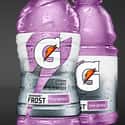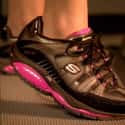-
(#4) Weight Loss Wraps
You've likely seen ads for these pop up at some point while scrolling through Instagram. But save your money, because it's all in the fine print: "These claims have not been clinically proven or evaluated by the FDA." That means there haven't been any clinical trials which support the claims these products make.
To be fair, there haven't been any clinical trials that disprove their claims, either, but many experts believe that any weight loss resulting from a body wrap is temporary.
-
(#7) Magnet Therapy
Magnet therapy is touted as a method of pain relief, supposedly increasing blood flow through tissues. Yet according to EMF Science, "Many well-conducted studies [like this one and this one] over the past three decades have shown that static magnetic devices offer no more or no less benefit than sham devices devoid of a magnet, in essence demonstrating the placebo effect magnets have on their users."
If you suffer from chronic pain, there are legitimate options out there - but magnet therapy isn't one of them.
-
(#12) Rental Car Insurance
You should check with your insurance agent to be sure you're covered, but many times, you don't need to pay for rental car insurance. If you have comprehensive and collision auto insurance, your policy should cover rental cars as well. -
(#5) Sports Drinks
A study published in the BMJ (British Medical Journal) explored the claims many sports drink manufacturers make about the constant need to stay hydrated. They found that there is actually no need to "stay ahead of your thirst." In fact, the study concluded that overhydration can be far worse for you than dehydration. It also called out the hypocrisy of the Gatorade Sports Science Institute (GSSI), a Gatorade-owned research facility. Here's how GSSI describes itself:
"GSSI scientists study the effects of nutrition on the human body before, during and after exercise. For more than two decades, hundreds of amateur, elite and professional athletes have participated in testing with GSSI and in studies with university research partners around the world. GSSI’s headquarter lab, mobile and satellite laboratories and on the field testing enable GSSI to do leading research with the aim to provide athletes with advice and products that help their performance and achieve their goals."
But don't believe their benevolent claims. The Center for Food Safety reports, "With this sophisticated operation, Gatorade is seeking to legitimize its products as a necessary component to sports and for athletes, whether pro or amateur. It’s probably one of the most successful examples of marketing-driven science, given how prevalent Gatorade products are in sports."
So next time a sports drink advertisement tries to tell you that you need to immediately replace all the electrolytes you sweat out when you exercise, don't believe it. -
(#1) Skechers Shape-ups
Skechers advertised that its "Shape-ups shoes would help people lose weight, and strengthen and tone their buttocks, legs, and abdominal muscles,” and their ads featured celebs Kim Kardashian and Brooke Burke. Yet they had to pay out a $40 million lawsuit to angry customers because the shoes didn't work as advertised.
None of Skechers's claims about the benefits of Shape-ups were supported by scientific evidence.
-
(#10) Ionic Foot Baths
Ads for ionic foot spas seem like they've been on TV forever. They're a staple of late-night infomercials, and they purport to pull toxins out of your body through your feet. One common claim is toxins flow through your body and pool in your feet, because gravity, maybe? Anyway, it's hard not to be sucked in by those ads. Just look at all those gross stuff in the bath. It's gotta be doing something, right?
There's no conclusive proof that ionic foot baths don't work, but there are plenty of reasons to be skeptical. Only one scientific study has been done on ionic foot baths, and while the scientists concluded that there is no factual basis to the claim that toxins can be pulled from your body through your feet, the study also had a number of flaws, including the fact that their sample size was only six people.
Also, Andrew Barron, chairman of chemistry and professor of materials science at Rice University, shared his thoughts on ionic foot baths with the Los Angeles Times:
"Barron recently tested the water from an ionic foot bath after a 30-minute session. The water was murky, but it didn't show any traces of heavy metals or industrial chemicals other than a few chunks of rust that may have flaked off the electrodes. 'If there was a way to pull that through the skin, I'd be shocked,' he says. 'They're saying things that sound good, but they have absolutely no validity on this planet.'"
The claims about ionic foot baths detoxifying your body are are murky at best, so it's probably best to just avoid them.
New Random Displays Display All By Ranking
About This Tool
Our data comes from Ranker, If you want to participate in the ranking of items displayed on this page, please click here.
















